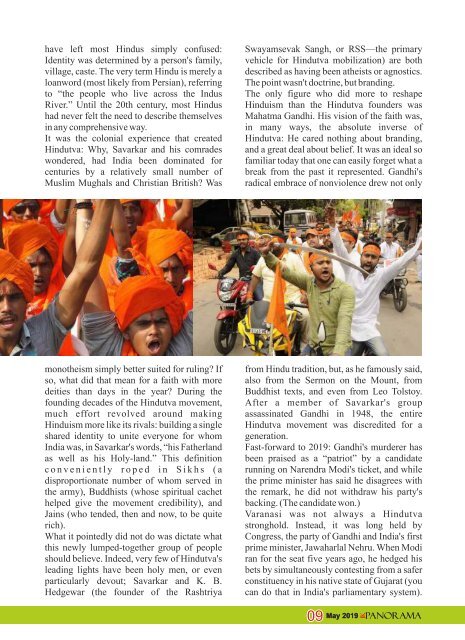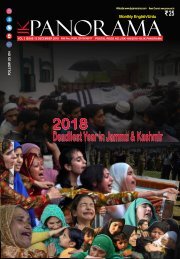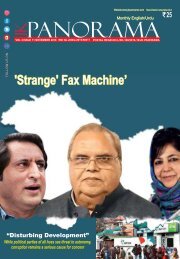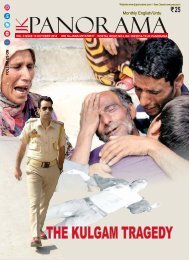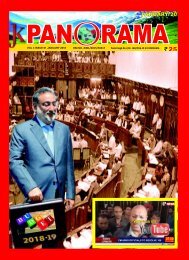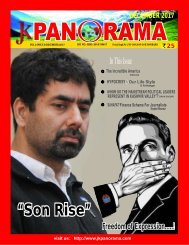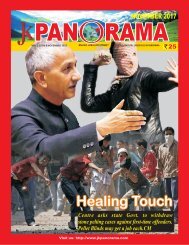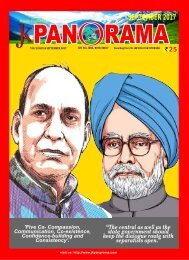You also want an ePaper? Increase the reach of your titles
YUMPU automatically turns print PDFs into web optimized ePapers that Google loves.
have left most Hindus simply confused:<br />
Identity was determined by a person's family,<br />
village, caste. The very term Hindu is merely a<br />
loanword (most likely from Persian), referring<br />
to “the people who live across the Indus<br />
River.” Until the 20th century, most Hindus<br />
had never felt the need to describe themselves<br />
in any comprehensive way.<br />
It was the colonial experience that created<br />
Hindutva: Why, Savarkar and his comrades<br />
wondered, had India been dominated for<br />
centuries by a relatively small number of<br />
Muslim Mughals and Christian British? Was<br />
Swayamsevak Sangh, or RSS—the primary<br />
vehicle for Hindutva mobilization) are both<br />
described as having been atheists or agnostics.<br />
The point wasn't doctrine, but branding.<br />
The only figure who did more to reshape<br />
Hinduism than the Hindutva founders was<br />
Mahatma Gandhi. His vision of the faith was,<br />
in many ways, the absolute inverse of<br />
Hindutva: He cared nothing about branding,<br />
and a great deal about belief. It was an ideal so<br />
familiar today that one can easily forget what a<br />
break from the past it represented. Gandhi's<br />
radical embrace of nonviolence drew not only<br />
monotheism simply better suited for ruling? If<br />
so, what did that mean for a faith with more<br />
deities than days in the year? During the<br />
founding decades of the Hindutva movement,<br />
much effort revolved around making<br />
Hinduism more like its rivals: building a single<br />
shared identity to unite everyone for whom<br />
India was, in Savarkar's words, “his Fatherland<br />
as well as his Holy-land.” This definition<br />
c o n v e n i e n t l y r o p e d i n S i k h s ( a<br />
disproportionate number of whom served in<br />
the army), Buddhists (whose spiritual cachet<br />
helped give the movement credibility), and<br />
Jains (who tended, then and now, to be quite<br />
rich).<br />
What it pointedly did not do was dictate what<br />
this newly lumped-together group of people<br />
should believe. Indeed, very few of Hindutva's<br />
leading lights have been holy men, or even<br />
particularly devout; Savarkar and K. B.<br />
Hedgewar (the founder of the Rashtriya<br />
from Hindu tradition, but, as he famously said,<br />
also from the Sermon on the Mount, from<br />
Buddhist texts, and even from Leo Tolstoy.<br />
After a member of Savarkar's group<br />
assassinated Gandhi in 1948, the entire<br />
Hindutva movement was discredited for a<br />
generation.<br />
Fast-forward to 2019: Gandhi's murderer has<br />
been praised as a “patriot” by a candidate<br />
running on Narendra Modi's ticket, and while<br />
the prime minister has said he disagrees with<br />
the remark, he did not withdraw his party's<br />
backing. (The candidate won.)<br />
Varanasi was not always a Hindutva<br />
stronghold. Instead, it was long held by<br />
Congress, the party of Gandhi and India's first<br />
prime minister, Jawaharlal Nehru. When Modi<br />
ran for the seat five years ago, he hedged his<br />
bets by simultaneously contesting from a safer<br />
constituency in his native state of Gujarat (you<br />
can do that in India's parliamentary system).<br />
09 May 2019


